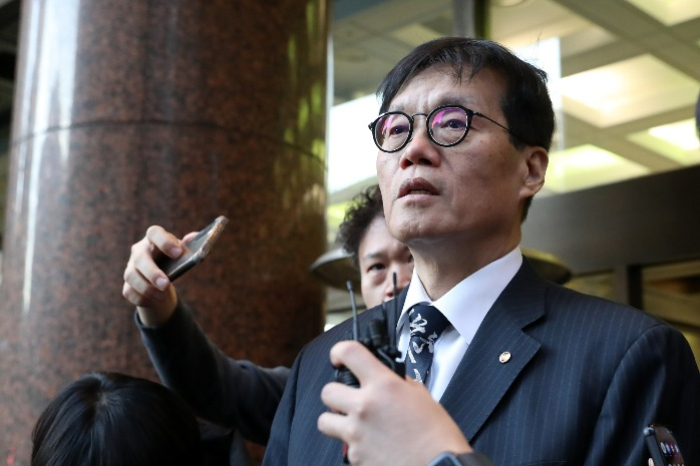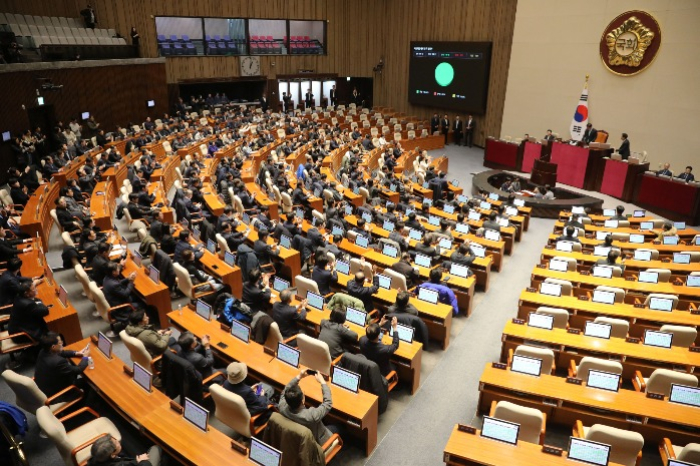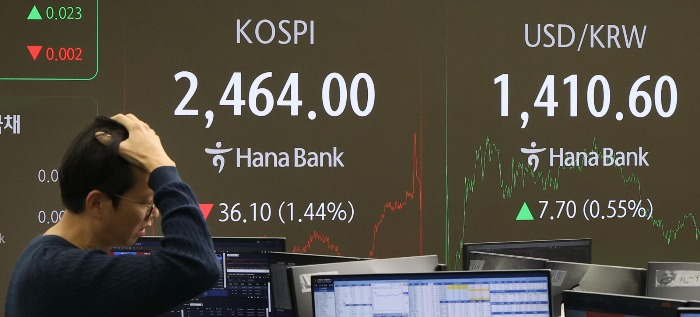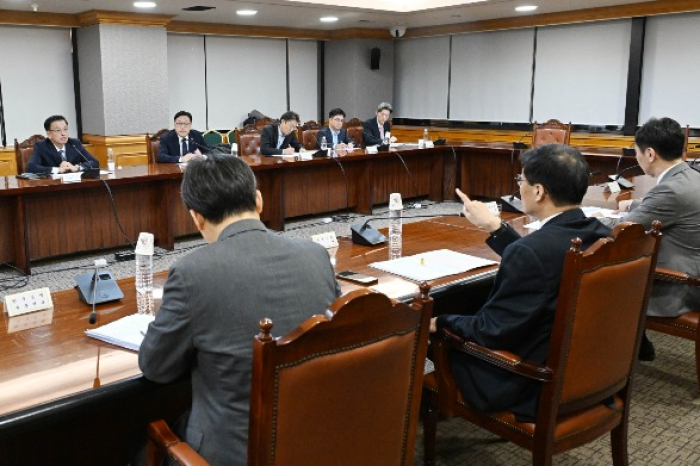Markets
BOK to buy repos to counter martial law-driven market tantrum
Korea’s financial markets stabilized somewhat on Wednesday from the overnight market rout caused by the martial law decree
By Dec 04, 2024 (Gmt+09:00)
4
Min read
Most Read
LG Chem to sell water filter business to Glenwood PE for $692 million


KT&G eyes overseas M&A after rejecting activist fund's offer


Kyobo Life poised to buy Japan’s SBI Group-owned savings bank


StockX in merger talks with Naver’s online reseller Kream


Meritz backs half of ex-manager’s $210 mn hedge fund



South Korea’s central bank will provide "unlimited" liquidity to the country’s financial markets by purchasing repurchase agreements, or repos, as part of efforts to stabilize Asia’s No. 4 economy’s financial markets following a night of mayhem caused by President Yoon Suk Yeol’s martial law declaration, which was lifted six hours later.
The Bank of Korea (BOK) held an emergency monetary policy meeting on Wednesday morning and decided to temporarily buy repos from an expanded list of financial institutions from December 4, 2024 to February 28, 2025.
Repos are short-term agreements to sell securities and repurchase them later at slightly higher prices and are typically used to raise short-term capital. Central banks use them in open market operations to boost the volume of liquidity in the market.
The decision comes after BOK Governor Rhee Chang-yong met with the chiefs of the Financial Services Commission and the Financial Supervisory Service at an emergency meeting convened by the country’s Financial Minister Choi Sang-mok, also Korea’s deputy prime minister, after President Yoon declared martial law in a surprise move on Tuesday night.

The BOK’s emergency monetary policy meeting was the first such meeting since June 2021 when the central bank gathered to amend lending conditions for special purpose vehicles.
UNCERTAINTY LINGERS
In the overnight market, the Korean won plunged to as low as 1,443.40 per US dollar, its weakest since October 2022, immediately after the martial law decree.
But it trimmed its losses and ended at the 1,410 level after the Korean Parliament voted to repeal the decree and, just six hours after his declaration, President Yoon lifted the country’s first martial law in more than four decades.
On Wednesday the Korean financial markets took a hit in the aftermath of the surprise decree and reversal.
The Korean won traded 0.6% lower at 1,410.60 against the greenback on Wednesday afternoon.
The country’s benchmark stock index Kospi ended down 1.4% at 2,464.00 on Wednesday from the previous session, while the junior market Kosdaq closed 2% lower at 677.15.
Foreign investors’ net selling of Korean stocks from both Kospi and Kospi200 Futures markets hit about 780 billion won ($552 million). They net sold 14.8 billion won worth of Kosdaq-listed stocks.

South Korean government bond yields rose across the board the afternoon after the martial law chaos.
The highly liquid Korean government’s three-year bond yield added 4.1 basis points to 2.626%, while the five-year debt yield rose 3.4 bps to 2.640% on Wednesday morning, according to the Korea Financial Investment Association. The 10-year yield climbed 5.2 bps to 2.765%.
“Our current financial market conditions are stable compared to (during) the market routs caused by the COVID-19 outbreaks and the default of the Legoland theme park,” BOK Deputy Governor Park Jong-woo said at a briefing after the BOK emergency meeting.
“Market concerns over volatility are lower since the central bank pivoted to an accommodative monetary stance with rate cuts,” Park added.
GOVERNMENT PLEDGES UNLIMITED LIQUIDITY
After the martial law was lifted, Finance Minister Choi held another emergency financial meeting with the heads of the financial authorities in the morning and vowed to pump “unlimited” liquidity into financial markets.
As part of measures to reduce market volatility, the FSC, the country’s top financial regulator, will mobilize a stock market stabilization fund worth 10 trillion won, which can be used at any time, and take other market stabilization measures if necessary, FSC Chairman Kim Byoung-hwan, said at the meeting.

He added that 40 trillion won worth of funds are also in store to be injected to stabilize the bond market at any time.
The financial regulator will also closely monitor the foreign currency prudence of local financial firms and take necessary measures to pour ample liquidity into the currency market if needed.
S&P HOLDS KOREA’S RATING AT AA
Meanwhile, global credit rating house S&P Global Ratings said it would not consider changing Korea’s sovereign rating in the near term because of President Yoon’s overnight martial law declaration.
S&P's Kim Eng Tan, senior director of sovereign and international public finance ratings, said at a seminar held in Seoul on Wednesday that Korea's sovereign credit rating will remain unaffected.
"From our perspective, the high AA rating that we have (on Korea's creditworthiness), I think, to a large extent, reflects our expectations that things will be more or less strong within Korean institutions," said Tan.
AA is the third-highest rating of S&P’s 21 ratings.
The director, however, warned that the overnight incident would come as "a negative shock" that may impact the decisions of international investors.
Write to Jin-gyu Kang, Hyun-Woo Kang and Se-Min Huh at josep@hankyung.com
Sookyung Seo edited this article.
More to Read
-
 Central bankBOK makes 1st back-to-back rate cut since 2009 global crisis
Central bankBOK makes 1st back-to-back rate cut since 2009 global crisisNov 28, 2024 (Gmt+09:00)
3 Min read -

-
 Corporate bondsKorean firms at risk of credit rating downgrade on Legoland woes
Corporate bondsKorean firms at risk of credit rating downgrade on Legoland woesNov 13, 2022 (Gmt+09:00)
2 Min read
Comment 0
LOG IN


